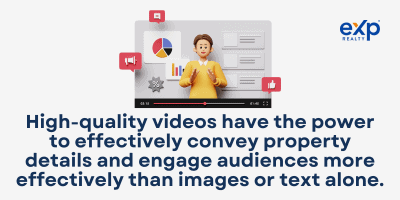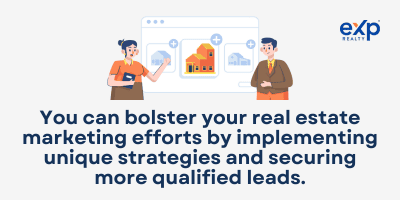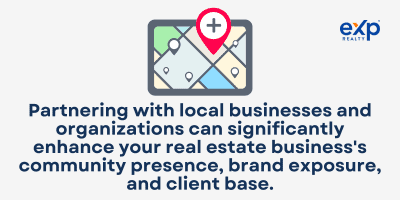Navigating the dynamic landscape of the real estate business can be challenging, especially when coming up with real estate marketing ideas and implementing them. As a real estate agent, staying ahead of the curve is crucial. This comprehensive guide explores eight unique real estate agent marketing strategies for 2023.
You can elevate your real estate business to new heights by embracing these cutting-edge strategies. So let’s dive in and propel your unprecedented success as a real estate agent in 2023 and beyond!
Understand the Target Audience
Understanding your target audience is essential for designing an effective real estate marketing strategy. To achieve this, conducting thorough market research is crucial. Market research involves a systematic and objective collection and analysis of data about your potential clients. You can employ various methods, such as online surveys, in-person interviews, focus groups, or social media polls, to gather valuable insights.

In addition to traditional research methods, online resources can provide extensive market data. Websites like Statista and MarketResearch offer comprehensive information about the real estate industry and consumer behavior.
Leveraging tools like Google Analytics and Google Maps lets you track user behavior on your real estate website, providing valuable insights into their preferences and interests, as well as neighborhood features, commute times, and nearby facilities.
The Power of Trend Analysis
Once you have gathered sufficient data, it’s important to analyze it to identify patterns and trends. This analysis should help answer questions such as:
- What type of properties are potential buyers interested in?
- Which social media platforms do they frequent the most?
- What kind of content engages them the most?
By answering these questions, you can better understand your target audience’s preferences and tailor your marketing strategies accordingly.
Creating buyer personas based on the collected data is another crucial step. Buyer personas are fictional representations of your ideal clients built from the insights gathered during market research.
These personas should include demographic information, preferences, buying behaviors, and motivations. By developing accurate buyer personas, you can better align your real estate marketing plan with your target audience’s specific needs and desires.
Harness the Power of Social Media
Social media platforms have revolutionized the way we connect, communicate, and conduct business, presenting real estate professionals with a powerful tool to reach a broader audience and engage potential clients.

To harness the power of social media for your real estate business, start by creating an engaging social media profile that accurately represents your brand. Pay attention to your bio and contact details, and showcase your best properties.
Once your account is set up, consistently post relevant content, such as new listings, real estate tips, market trends, and local community highlights. You should also promptly respond to comments and messages to foster a strong relationship with your audience.
Consider utilizing paid advertising options available on social media platforms. For example, Facebook offers highly targeted advertising features that enable you to reach prospective buyers based on their interests, location, and more. This can significantly expand your online presence and attract potential leads.
The Influencer’s Endorsement
Additionally, collaborating with influencers and industry experts can be another effective strategy. Seek out influencers who have a substantial following in your target market and propose partnerships or collaborations. Their endorsements can enhance your brand’s visibility, credibility, and reach.
Whether you decide to use TikTok, Instagram, or LinkedIn, don’t forget to monitor your social media performance. Utilize the analytics tools provided by each platform to measure the effectiveness of your social media posts and campaigns. This data will allow you to make informed decisions and make necessary adjustments to your digital marketing strategy.
Embrace Video Marketing
Video marketing has become essential to successful strategies in today’s real estate marketing landscape. High-quality videos have the power to effectively convey property details and engage audiences more effectively than images or text alone.

To begin, focus on creating property showcase videos highlighting your listings’ unique features. Investing in professional-grade photography and videography is worthwhile, as it significantly impacts the viewer’s perception of the properties you represent.
Virtual tours and live streams provide potential buyers with an immersive experience, helping them make more informed decisions. With the advancements in 360-degree video technology, prospective buyers can virtually tour a property from the comfort of their homes, catering to the growing demand for digital experiences.
Video testimonials and client success stories serve as social proof, reinforcing your reputation as a trusted real estate agent. These videos should feature previous clients sharing their positive experiences working with you, as they can significantly influence potential clients’ decisions to choose you as their agent.
Lastly, to maximize exposure, leverage your video content across multiple platforms. Share your videos on your website, YouTube channel, and social media accounts, and incorporate them into your email marketing campaigns.
Build a Strong Online Presence
In today’s digital age, establishing a strong online presence is crucial for real estate professionals. It can significantly enhance your real estate business by increasing visibility, boosting credibility, and facilitating connections with potential clients. Here are key strategies to build a robust online presence:
Create an Engaging Real Estate Website
Your website is often the first interaction potential buyers have with your brand. Design a visually appealing and user-friendly site that captivates visitors and encourages them to explore further. Showcase high-quality images and videos of your properties to create a captivating experience. Ensure easy navigation and prominent display of vital information like property listings and contact details.
Optimize Your Website for Search Engines
Implement search engine optimization (SEO) techniques to improve your site’s visibility in organic search results. Research and incorporate relevant keywords throughout your website, including title tags, meta descriptions, and content.
For instance, if you specialize in luxury real estate in Miami, use keywords like “luxury real estate agent in Miami” or “Miami luxury homes for sale.” Optimize your site’s speed and functionality to provide a seamless user experience.
Implement Effective Lead Capture Strategies
Convert website visitors into leads by implementing effective lead capture strategies. Offer valuable content, such as ebooks or market reports, in exchange for contact information. Incorporate prominent and user-friendly contact forms throughout your website.
Feature compelling calls-to-action (CTAs) that prompt visitors to take action, such as signing up for property alerts or scheduling a consultation. Personalize your approach to engage potential clients and gather their contact details for follow-up.
Leverage Online Directories and Listing Platforms
Expand your reach by leveraging online directories and real estate listing platforms. These platforms allow you to showcase your listings to a larger audience and drive traffic to your website. Optimize your profiles on these platforms, ensuring comprehensive information about your real estate business.
Keep your listings up-to-date and respond promptly to inquiries. Encourage satisfied clients to leave positive reviews on these platforms to enhance your credibility and attract prospective buyers.
Engage and Interact on Social Media
Harness the power of social media to connect with potential clients and amplify your online presence. Create engaging profiles on platforms like Facebook, Instagram, and LinkedIn. Regularly post relevant and valuable content that resonates with your target audience, including new listings, real estate tips, market trends, and local community highlights.
Engage with your audience by promptly responding to comments, messages, and inquiries. Collaborate with influencers or industry experts to expand your reach and credibility.
Implement Innovative Lead Generation Tactics

Employing innovative lead-generation tactics is crucial to stand out and attract more potential clients. You can bolster your real estate marketing efforts by implementing unique strategies and securing more qualified leads. Here are some effective tactics to consider:
Virtual Open Houses and Webinars
Take advantage of virtual open houses and webinars to engage potential buyers and showcase your expertise. Virtual open houses allow viewers to explore properties remotely, while webinars provide an opportunity to share valuable insights on relevant real estate topics. Hosting these interactive events can attract potential clients and position you as a knowledgeable industry professional.
Personalized Virtual Consultations
Offer one-on-one virtual consultations to connect with potential clients on a personal level. These consultations provide an opportunity to understand their specific needs and offer tailored advice. You can build trust and increase your conversion rates by providing personalized service.
AI-Powered Chatbots
Implement AI-powered chatbots on your website to enhance the user experience and collect lead information. Chatbots can provide instant, 24/7 customer support, answering common queries and qualifying leads. This technology streamlines your lead management process and provides a seamless experience for website visitors.
Targeted Email Marketing Campaigns
Despite the rise of social media, email marketing remains a highly effective channel for nurturing leads and driving conversions. Segment your email list based on lead preferences and engagement levels. This allows you to send highly relevant content to each segment, increasing engagement rates and the likelihood of conversion.
Collaborate with Influencers
Partnering with influencers in the real estate industry can expand your reach and attract potential clients. Identify influencers with a substantial following in your target market and propose collaborations or endorsements. Their endorsement can boost your credibility and expose your brand to a wider audience.
Video Content Marketing
Leverage the power of video content to engage and attract potential clients. Create high-quality property showcase videos, video tours, and client video testimonials. Video content is highly engaging and can effectively convey property details, making it a valuable tool in your lead-generation strategy.
Referral Programs
Implement referral programs to encourage satisfied clients to refer their friends and family to your real estate services. Offer incentives such as discounts, gift cards, or exclusive access to new listings. Referral programs tap into the power of word-of-mouth marketing, which is a highly effective lead-generation tactic.
Partner With Local Businesses and Organizations
Establishing strategic alliances and partnering with local businesses and organizations can significantly enhance your real estate business’s community presence, brand exposure, and client base.
You position yourself as a trusted and active community member by engaging in collaborative efforts and supporting local initiatives. Here are some effective strategies for partnering with local entities:
Complementary Business Collaborations
Form partnerships with local businesses that complement your real estate services. Identify companies such as moving companies, home insurance providers, or home renovation contractors that share your target audience.
Collaborate on joint events, offer combined service packages, or refer clients to one another. These collaborations enhance the value you provide to clients, boost your reputation, and increase referrals.
Sponsorship of Community Events and Initiatives
Supporting local community events or initiatives through sponsorship is an impactful way to give back while gaining exposure for your real estate business. Consider sponsoring local sports teams, funding community projects, or participating in charity events.
Being actively involved in the community enhances your visibility, generates positive publicity, and demonstrates your commitment to the local area. Sponsorship also provides opportunities to network with potential clients and local businesses.
Collaboration With Local Influencers and Bloggers
Partnering with local influencers and bloggers can significantly expand your brand exposure and reach. Identify influencers with a substantial local following and propose collaborations, such as promoting your listings, attending your open houses, or sharing their experiences working with you as a real estate agent.
Collaborating with local bloggers presents opportunities for them to feature your listings in neighborhood guides, conduct interviews about the local real estate market, or review your services. These partnerships can drive targeted traffic to your business and help you tap into new client networks.
Participation in Local Business Associations
Joining local business associations and organizations is a powerful way to establish connections within your community. Engage with organizations such as chambers of commerce or industry-specific associations.
Attend networking events, participate in meetings, and contribute to discussions. Building relationships with fellow business owners and professionals can lead to referrals and collaborations while positioning you as a knowledgeable and trusted expert.
Community Education and Workshops
Offer educational workshops or seminars to the community on topics related to real estate. Share insights on home buying, selling, investment strategies, or local market trends. You position yourself as a go-to resource and establish credibility by providing valuable information. These workshops can be conducted with local libraries, community centers, or educational institutions.
Leverage Data and Analytics
Real estate professionals can leverage data and analytics to gain valuable insights, make informed decisions, and maximize the effectiveness of their marketing efforts. Here are some key strategies for utilizing data and analytics in real estate marketing:
Understanding Your Target Market Through Data Analysis
Data-driven insights enable you to better understand your target market and identify potential leads. Analyze user behavior on your website, social media engagement rates, email open rates, and subject lines to gain insights into what resonates with your audience.
By tailoring your marketing strategy to match their preferences, you can optimize your campaigns for maximum impact and attract a larger audience. For example, if data reveals that a significant portion of your website visitors are young professionals, focus on creating content and listings that cater to their needs and preferences.
Similarly, if certain types of content generate higher engagement on social media, prioritize producing more of that content to drive audience interaction.
Monitoring and Adapting to Market Trends
Real estate professionals need to be informed about market trends. By leveraging analytics tools, you can gain insights into industry trends such as popular property types, emerging neighborhoods, or fluctuating property prices. Regularly monitoring these trends empowers you to adjust your marketing strategies accordingly.
For instance, if there is a growing demand for sustainable homes, highlight the eco-friendly features of your listings to attract environmentally conscious buyers. By aligning your marketing efforts with market trends, you position yourself as an expert and increase your chances of attracting potential clients.
Utilizing Customer Relationship Management (CRM) Systems
CRM systems are powerful tools that streamline the selling process by tracking and managing client interactions. These systems enable you to store client information, track communication history, manage tasks, and more. Implementing a CRM system ensures no client is overlooked and every interaction is personalized and timely, helping convert visitors into leads.
Effectively utilizing a CRM system enhances your client relationships and improves client satisfaction. By having a holistic view of client data, you can deliver personalized experiences, anticipate their needs, and provide tailored recommendations that align with their preferences.
Harnessing Predictive Analytics for Market Forecasting
Predictive analytics leverages historical data to forecast future outcomes. In real estate, this approach is invaluable for predicting market trends, optimizing marketing efforts, and gaining a competitive edge. By analyzing historical data on price changes, demand shifts, and buyer preferences, you can make data-driven decisions about your marketing strategy and guide potential customers through the marketing funnel.
For example, predictive analytics can help you anticipate upcoming market trends and adjust your listings, pricing, and messaging accordingly. By staying ahead of the curve, you can position yourself as a trusted advisor to clients and maximize your marketing ROI.
Stay Ahead With Emerging Technologies
The real estate industry is undergoing a technological revolution, and staying ahead of the curve can give you a competitive edge. Emerging technologies offer new and innovative ways to showcase properties, engage with clients, and elevate the overall customer experience.
Here are some key areas where you can leverage emerging technologies in your real estate marketing efforts:
Virtual Reality (VR) and Augmented Reality (AR)
VR and AR technologies have transformed property viewing experiences. With VR, potential buyers can take virtual tours of properties from anywhere, including their mobile devices, providing an immersive experience. This technology allows them to explore properties and get a sense of the space without being physically present.
AR, on the other hand, enables the overlay of virtual elements onto the real world. Using AR apps, potential buyers can visualize how a property could look with different furnishings or decorations. This interactive experience helps them envision the potential of a space and make more informed decisions.
Artificial Intelligence (AI) Tools
AI-powered tools have become invaluable in real estate marketing. These tools can analyze vast amounts of data to provide personalized recommendations based on a user’s preferences, behavior, and past interactions. By understanding individual client needs, you can offer targeted property suggestions that align with their unique requirements.
Moreover, AI can automate repetitive tasks and improve customer service. Chatbots, for instance, can handle frequently asked questions, provide instant responses, and schedule property viewings. This frees your time, increases efficiency, and enhances the customer experience.
Smart Home Technology
The rise of the Internet of Things (IoT) has given birth to smart home technology. Integrating smart features into properties enhances their appeal and opens up new marketing opportunities. You can attract tech-savvy buyers who value convenience, sustainability, and modern living by showcasing smart home capabilities, such as automated lighting, security systems, or energy management.
Drone Photography and Videography
Drones have revolutionized the way properties are showcased. Aerial photography and videography captured by drones provide stunning visuals highlighting a property’s features, location, and surrounding area. This immersive experience gives potential buyers a comprehensive view of the property and its surroundings, enticing them to explore further.
Blockchain Technology
Blockchain technology offers transparency, security, and efficiency in real estate transactions. Utilizing blockchain-based platforms can streamline property transactions, reduce paperwork, and enhance trust between parties. This technology can be particularly useful in international real estate transactions, where trust and security are paramount.
Key Takeaways
As the real estate industry evolves, agents must adapt and implement an effective real estate marketing plan to thrive in 2023 and beyond. When drafting your real estate marketing plan, keep in mind the following:
- Understand your target audience and shape your marketing efforts accordingly. Use social media, video marketing, and a strong online presence to engage potential clients effectively.
- Social media platforms, or what we can call the ‘real estate social media,’ like Facebook, Instagram, and LinkedIn, are powerful tools for real estate marketing. Regularly share helpful content such as informative blog posts and utilize targeted advertising to showcase your expertise and attract potential clients.
- Video marketing is essential for capturing attention and providing an immersive experience. Create high-quality property showcase videos, virtual tours, and client testimonials to convey property details and establish credibility.
- Invest in a visually appealing and user-friendly website optimized for search engines, and enhance your online visibility with a well-maintained Google Business Profile. Implement lead capture strategies to convert website visitors into leads, and consider utilizing Google Ads to reach a wider audience.
- Embrace innovative lead generation tactics such as virtual open houses, webinars, real estate email marketing, and one-on-one virtual consultations. These personalized experiences build trust, provide tailored advice, and engage prospective clients.
- Collaborate with local businesses and organizations to strengthen your community presence and generate referrals. Partnering with complementary service providers and sponsoring local events expands your reach and visibility.
- Stay ahead of the curve by leveraging emerging technologies like virtual reality, augmented reality, and AI tools. These technologies enhance the customer experience, provide personalized recommendations, and automate tasks.
To take the next step in your real estate career, connect with a local eXp agent or explore the diverse range of properties available at eXp Realty, as recommended by real estate brokers and backed by customer reviews. Don’t wait any longer to position yourself for future growth and success in the real estate industry!
Frequently Asked Questions: Real Estate Agent Marketing
If you still have questions, check out these FAQs about real estate marketing for more information:
What marketing works best for real estate agents?
Different marketing strategies can be effective for real estate agents, depending on their target audience, location, and resources. However, the most effective strategies include social media, SEO, email, content, and video marketing.
What are the 4 P’s of marketing in real estate?
The 4 P’s of marketing in real estate are:
- Product (the property and its features)
- Price (the listing price)
- Place (the location and distribution channels)
- Promotion (the strategies and tactics used to market the property).
What do marketers do in real estate?
In real estate, marketers design and implement strategies to promote properties, generate leads, and convert those leads into buyers or sellers. This often involves market research, creating marketing materials, managing online presence, and analyzing data for insights.
What should be included in real estate marketing?
Real estate marketing should include a clear understanding of the target audience, an effective online presence (website, social media, listings), high-quality photos and videos, engaging content, an email marketing strategy, and data utilization for decision-making.
How do most real estate agents get their leads?
Real estate agents get leads through various methods, including online marketing, referrals, networking, open houses, direct mail campaigns, and paid advertising, guiding potential customers through the marketing funnel.
How do I start marketing myself as a real estate agent?
To start marketing yourself as a real estate agent, establish your social media presence, identify your target audience, create engaging and relevant content, network within your local community, and use data to inform your strategies.
How much should I spend on marketing as a real estate agent?
The amount you should spend on marketing depends on several factors, including your business goals, budget, target audience, and the competitive landscape. Generally, many businesses allocate around 10% of their revenue to marketing efforts.





